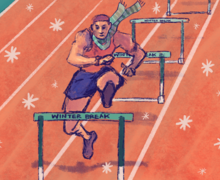Jim Boeheim doesn’t think his players are tired, so please stop asking
Todd Michalek | Staff Photographer
Syracuse head coach Jim Boeheim has had to shift his lineup this year due to several injuries.
Jim Boeheim hears you, and he wants you to know he doesn’t care.
Several times this season, Syracuse’s head coach has been asked about his squad’s lack of depth. Due to persistent injuries and Geno Thorpe quitting, SU has consistently only had six or seven scholarship players available for most games, and the team’s three offensive weapons — Tyus Battle, Frank Howard and Oshae Brissett — rank first, second and fourth in the Atlantic Coast Conference in minutes played. Players have mentioned the workloads can be fatiguing.
Will the team, people wonder, hold up with its key players logging so many minutes?
We’ll find out for sure as Syracuse (18-9, 7-7 Atlantic Coast) starts its crucial, season-ending stretch against No. 10 North Carolina (21-7, 10-5) on Wednesday at 7 p.m. in the Carrier Dome. But Boeheim has dismissed those concerns all year.
Take Boeheim’s answer when a reporter asked him on Jan. 29 if the Orange’s defense has suffered because he plays his players such heavy minutes.
“People who think that are full of sh*t,” Boeheim said. “It’s like, we don’t work on defense? They don’t watch our defense. … (Minutes) has nothing to do with it. I think players can play big minutes, I just think some teams don’t play guys big minutes. They play eight or nine guys and they spread the minutes out and that’s the way they choose to play and that’s good. We, traditionally, have played two or three guys heavy minutes anyway. But this year we don’t really have an option.”
Boeheim paused. Then he continued: “I just don’t think (minutes) are any kind of a big deal at all. If you ask players at the end of the game who played those minutes, no one is not ready to go longer, and we’ve played some of our best basketball at the end of the game. So, guys aren’t tired, obviously.”
 Kevin Camelo | Digital Design Editor
Kevin Camelo | Digital Design Editor
In all of Boeheim’s explanations, he tries to elaborate on why he can dole out heavy minutes, because the game has changed from when he played at Syracuse 52 years ago. Now, television contracts are like double jeopardy, filling up the athletic department’s pockets with conference revenue-sharing money and giving players an approximately two-and-a-half-minute rest for every four minutes of game clock with commercial breaks.
Even way back when, he said, when the good players came out during the game, they sat for two, three, four minutes anyway. Not game minutes. Real minutes. Then they subbed back in and made an impact immediately. Without media breathers today, you couldn’t do it, he said, but they’re there, so might as well take advantage of them.
On Feb. 5 in Louisville, a reporter raised his hand.
“You’re down to six scholarship players right now,” he began, and Boeheim pursed his lips. “You had a seventh player play one minute today. What does that say about …” the reporter trailed off as Boeheim grinned, shrugged his shoulders and shook his head.
Then, the reporter finished his question: “What does that say about this team’s resiliency, and how can you build upon that for the rest of the ACC season?”
Syracuse is not alone, Boeheim said, and a few teams around the country play “five or six guys.” He pointed out that then-No. 1 Villanova scored 92 points to beat “a Top 15 team” in Seton Hall despite playing “one guy six minutes and one guy three.” Boeheim was close — the Wildcats actually played eight players, though the three off the bench totaled 20 minutes — but his point remained.
“Our players are in good shape, they’re capable, they don’t seem tired,” Boeheim said. “They make plays at the end of games, they’ve been playing the whole year. We’ve won overtime games, games at the end. It’s a different game today.”
He added the benefits are twofold, because “when you know you’re going to play the whole game, and you’re not as confident as you should be, I think you play better. I really do.”
Part of the reason Syracuse finds itself in this situation illustrates a core tenet of Boeheim’s coaching philosophy. Of course, he couldn’t have planned for the different circumstances that have cut down his roster, but he has also never believed in a deep bench. His belief in not recruiting a bunch of scholarship guys coincides with his conviction that the best approach is keeping his best squad on the floor as long as he can. He even wrote about the idea in his book.
That strategy has led to playing two or three players heavily every year. It’s no coincidence that the only two freshmen in the past five years to rank in the top five of minutes played in the ACC were both Boeheim’s players: Tyler Ennis in 2013-14 and Brissett this season.
Boeheim also doesn’t think a player’s age or body type makes a real difference in being able to play a lot of minutes. He knows what works and what doesn’t, and he wants to roll with it. He trusts his guys.
“Players want to play, and if they’re in good shape and strong kids, they can play a lot of minutes,” Boeheim said. “… I don’t think (minutes have a big effect). That’s just stuff people talk about. There’s a lot of stuff people talk about that’s a bad opinion, in my estimation.”
Published on February 20, 2018 at 10:41 pm
Contact Sam: sjfortie@syr.edu | @Sam4TR





